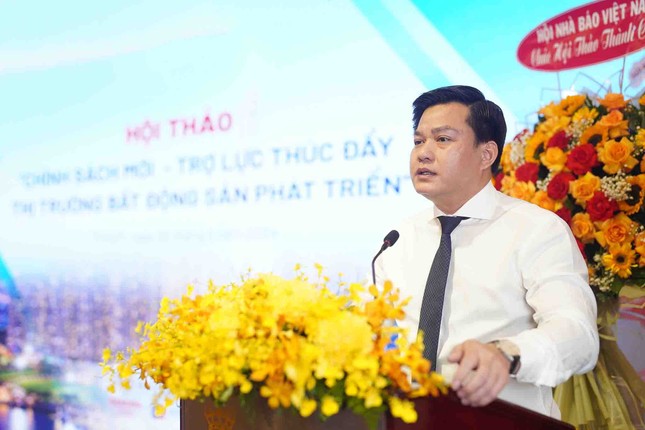This information was acknowledged and evaluated by leaders from the Ministry of Construction, the Ministry of Natural Resources and Environment, along with experts, businesses, and local authorities at the seminar "New Policies - Supporting the Development of the Real Estate Market", held on June 28th in Ho Chi Minh City, organized by Tien Phong Newspaper.
The new law aligns with the current reality and addresses numerous limitations
According to Mr Hoang Hai - Director General of the Housing and Real Estate Market Management Department, Ministry of Construction, “We have never witnessed such a high level of consensus among central and local agencies as we do now”. This demonstrates a strong determination to enact policies aimed at resolving challenges. All of this is geared towards supporting businesses in overcoming difficulties, facilitating project implementation, promoting capital flow, and fostering a healthy and transparent market.
Furthermore, the simultaneous amendment of four laws about housing development, the real estate market, land, etc., by the State demonstrates a resolute and cohesive legal approach. This will have a direct impact on housing, real estate projects, land, and credit.

Mr. Hoang Hai - Director General of the Housing and Real Estate Market Management Department, Ministry of Construction. (Photo: Dieu Phan)
"Recently, the National Assembly passed the following laws: the Law on Real Estate Business, the Housing Law, the Land Law, and the Law on Credit Institutions. The common thread among the amendments and additions in these laws is to ensure alignment with the current reality, address existing obstacles and limitations, and guarantee constitutionality, consistency, and harmonization with other relevant laws. This aims to promote decentralization, delegation of authority, streamline administrative procedures, and shift the focus from administrative management tools to effective utilization of economic instruments, ultimately fostering the development of the housing and real estate markets", stated Mr. Hai.
The Director General of the Housing and Real Estate Market Management Department further noted that a notable feature of the Law on Real Estate Business is that individuals engaged in real estate business on a small or micro scale are exempt from its regulatory scope.
Additionally, the law demonstrates consistency and supplementation, clarifying crucial legal concepts. It explicitly defines construction projects that are put into commercial operation relating to real estate, tourism, resorts, healthcare, sports, and culture to ensure appropriate treatment. Moreover, the law clarifies the legal status of condotels, officetels, etc., aiming to provide a more solid legal foundation for investment and business activities in these products.
The law also enhances transparency and disclosure of project information, providing buyers with greater access to accurate and reliable data. This strengthens consumer protection and mitigates the risk of disputes.
"Currently, the new law also mandates that projects, upon entering commercial operation, must disclose information, a requirement that was previously absent. Additionally, prohibited acts are now explicitly defined and more strictly regulated, and the rights of overseas Vietnamese to engage in real estate business have been expanded", Mr. Hai stated.
Accelerating Project Progress, Including Real Estate Developments
In his presentation on the new provisions of the Land Law, Mr. Nguyen Dac Nhan, Deputy Director of the Department of Land, Ministry of Natural Resources and Environment, stated that the 2024 Land Law includes 180 amended and supplemented articles from the 2013 Land Law, of which 80 articles are entirely new.
The new law stipulates a decentralization and delegation of authority regarding the conversion of rice cultivation land and forest land. Currently, the Provincial People's Council is authorized to make decisions on this matter, without the need to submit them to the Prime Minister as before. This expedites the progress of projects, including real estate projects.
Regarding Land Use Planning, the 2024 Land Law simplifies procedures and delegates authority to the Prime Minister for approval, instead of the National Assembly as previously required. Additionally, it decentralizes and delegates authority in land valuation, granting jurisdiction to the District People's Committee instead of the Provincial People's Committee as before.
According to Mr. Nhan, a notable feature of the 2024 Land Law is the rights of land users. The law stipulates more liberal homeownership rights, wherein Vietnamese people residing overseas are treated the same as those residing in Vietnam. The rights and obligations of these individuals are equal. Furthermore, individuals of Vietnamese origin residing overseas who no longer hold Vietnamese citizenship can inherit homeownership rights and inheritance rights as prescribed, ensuring the rights of land users.

Mr. Nguyen Dac Nhan, Deputy Director of the Land Administration Department, Ministry of Natural Resources and Environment. (Photo: Dieu Phan)
Notably, the new Land Law stipulates that public entities are permitted to convert the purpose of use for a portion of the land area they are currently using or leasing. Lease rights within land lease contracts and the rights of land users can be transferred or arise when economic organizations leasing land pay annual land rent. When selling assets attached to leased land, including the land itself, the land can be transferred directly, instead of the previous process where the state would reclaim the land and carry out further procedures before allowing land transfer.
Under the new Land Law, it is not required to include the land use purpose within the residential land area of each household in the land use planning. Agricultural land located within the residential land area previously had to be included in the land use planning, but now it is not necessary, and the land user has the right to convert the purpose of that area.
Also according to Mr. Nhan, under the new law, the acquisition of land for urban development projects, as stipulated in Article 27, clearly requires synchronized technical infrastructure. Land auctions are mandatory if the land is cleared, while bidding is required if the land needs to be acquired. To conduct a land auction for land use, there must be a plan, and compensation and resettlement plans must be approved by state agencies.
Furthermore, the new Law has removed the land price framework, allowing the Provincial People's Council to decide on the land price list. The land use regime is adjusted to facilitate resource mobilization. For instance, houses in urban areas can be used for business purposes, and agricultural land can be used for production. Rice cultivation land must be used for rice cultivation, but there is no area restriction. The scope of eligible transferees is expanded, including officials who can purchase land within the limit of up to 3 hectares. Beyond 3 hectares, they can still acquire additional land through transfer, but it must be used for its designated purpose./.


















